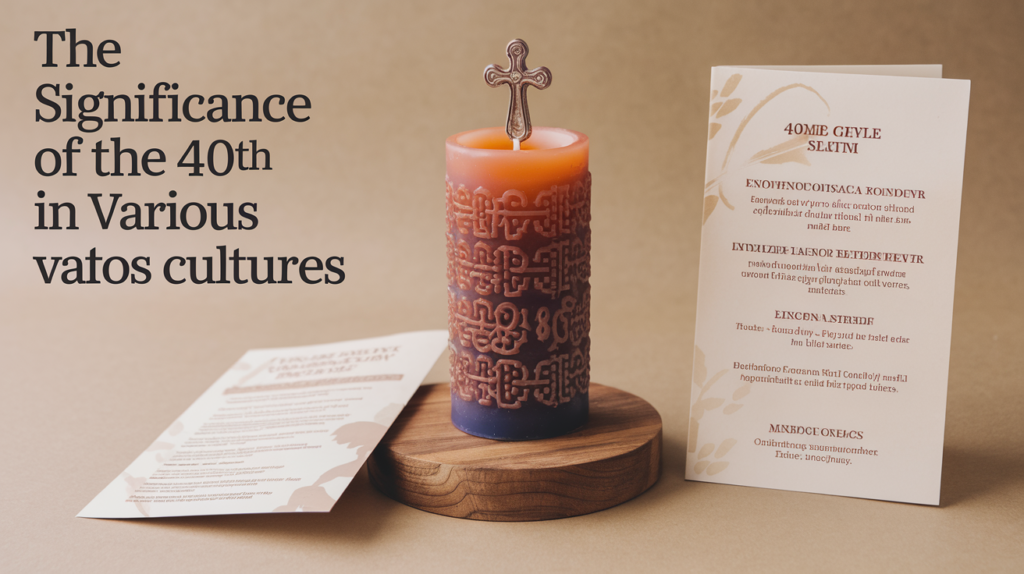The 40 days after death are symbolic as well as ritualistic for many religious and cultural practices associated with it. For many people, it is a vital spiritual process not only for the departed soul but also for the loved ones left behind. Whether it is the case of Eastern Orthodox Christianity, Catholicism, or any other form of spirituality, it is considered that this 40-day period marks the time when a person passes from one to another, reflection, and spiritual cleansing. The realization of this may be an aid to the mourners and bring about a feeling of closure.
Eastern Orthodox Christianity: The Soul’s Journey
In Eastern Orthodox Christianity, there is a very spiritual 40 days after death. According to the Orthodox religion, the soul travels after death for judgment, and the fate of this soul is decided; hence, on the 40th day, one conducts prayers, memorials, and other religious rituals so that the soul finds peace and comfort.
These 40 days are the most critical time the departed soul undergoes since it is in them that the soul reaches its final destination. This understanding is based on what the Church teaches, maintaining that all prayers and memorial services conducted during such a time may help a soul transition into eternal peace.
The 40th day is believed to be when a soul has been granted his or her portion in heaven or purgatory. This is the time when the prayers for the deceased soul are believed to be most effective in completing his or her journey to the afterlife. Among other traditions, families and friends gather to mark the day with a mass service or memorial where one prays for the soul, supporting loved ones still in anguish.
Catholicism and Other Christian Practices
In Catholicism, the post-mortem period is also crucial but here more attention is laid on prayer for the eternal repose of the soul. In the Catholic tradition, 40 days after death has some importance but to the extent it is celebrated in Eastern Orthodox Christianity. In the Catholic tradition, it is requested that the family of the deceased continue praying for the person for 40 days so that the soul might acquire rest and reach God in time.
The idea of a period for the completion of mourning or prayer is based on biblical values, which believe there is a need for spiritual intercession for the dead. For the whole period, Catholics also made use of the “Eternal Rest” prayer in seeking peace for those who had departed. For 40 days, the family and friends of the deceased may continue to mourn and heal with time, focusing on memory and spiritual reflection.

Jewish Traditions: The Mourning Process Shloshim
Even though the Jewish tradition doesn’t place much importance on the 40 days after death, it is very closely related to the Shloshim, the first 30 days of mourning. Shloshim is an important stage in the Jewish customs of mourning: the family participates in intense mourning rituals. During the first 30 days following the loss of a loved one, one prays, reflects on life, and leads a quieter lifestyle.
The mourning continues after Shloshim by observing the anniversary of the death, which is also seen in the reciting of Kaddish, being the prayer for the soul of the deceased, and then having a yahrzeit candle lit. It is not exactly the same as the 40-day aftermath of death in the tradition of Eastern Orthodox Christianity. Honoring the departed soul with the continuation of prayers for peace and rest remains in Jewish practices in mourning.
Healing and Comfort: Role of 40 Days After Death Quotes
The 40 days following the death are spiritually reflective, but also healing times, emotively. Members and friends comfort themselves by passing on a few meaningful quotes, poems, and religious prayers to the soul which aids them in dealing with the grievance process. Within the quotes, the loss is beautifully captured together with remembering the souls, along with hoping that they do find peace.
Grief and healing quotes may become gentle reminders to the people that they also must grieve naturally because there is a necessity to do so. Here are some insights:
“The pain of grief cannot be measured by days or months. It’s more of a process that continues with time as if it’s flowing to the sea.”
“Grief is the reminder of how much we loved. While mourning us, we also remember our dear one who has left with us.”
“Our loved ones never really leave us; they continue in our hearts, minds, and spirit in others who carry on their legacies.”
These words of wisdom comfort those who are looking at these 40 days after someone has died to remind them that grief is not easy, but the spiritual journey seeks healing and closure.
Personal Reflection in the 40 Days of Mourning
Although quotes and prayers are soothing, equal to healing is the self-reflection on one’s thoughts. During the 40 days following death, it becomes common for family and friends to share their memories and stories about the deceased; hence, a life narrative comes into being, which extends beyond the dying. Self-reflection can be articulated in memorial services, written tributes, or personal moments of remembrance.
For example, good memories, lessons learned, or shared experiences may be healing and enable people to recall their loved ones with love and gratitude. This process is quite therapeutic, changing grief into a celebration of life and a means of keeping the spirit of the departed alive in the hearts of those left behind.

Holding on to Hope Beyond Grief
This was when grief was 40 days after death. It is a point not to lose hope and, at the same time, through these spiritual beliefs religious activities, or personal reflection, they mark a point—a soul would reach a tranquil state, while mourners start their way towards recovery.
Eternal life belief is the heart of Eastern Orthodox Christianity and most faith traditions. The 40-day’ journey for the soul after death affords the belief that death is not an end but a transition, one that is marked by love, remembrance, and prayer. The 40th day is a great symbol of closure but at the same time the moment for hope renewal since it suggests life and love persist beyond death.
Also Read : www.healthsciencesforumcom: A Digital Hub for Health Science Insights
My last thoughts on 40 Days After Death quotes
Indeed, the 40 days after death is a time to mourn and remember, while also to be spiritually reflecting. In some ways, there are fewer defined particular quotes concerning the 40 days after death; however, there are lots of ideas to think about concerning love, peace, and hope so as to find one’s soul. This 40-day period, therefore, is not for Catholics and other Christian groups like the Eastern Orthodox about passing the moment. In essence, it is a very important period, spiritually speaking, of one’s soul and soul relatives.
It gives hope to those who are mourning when they have quotes and prayers; it helps them find a way through the grieving process, letting them know that their relationship still exists with the one who has passed on. These spiritual practices, personal memories, and meaningful reflections bring healing, understanding, and eventually, peace within these 40 days after death.

